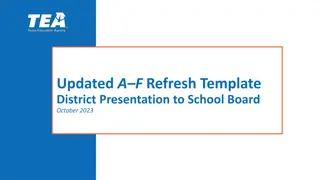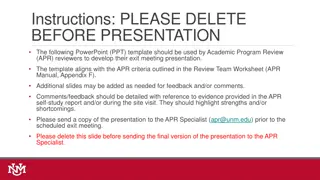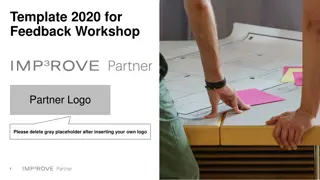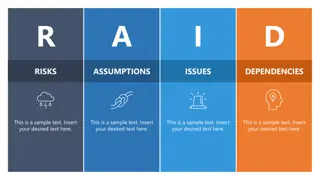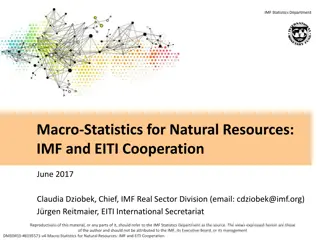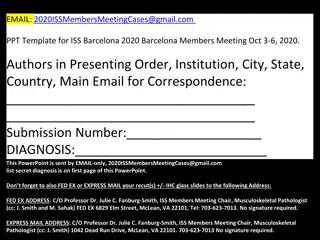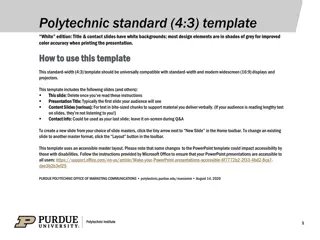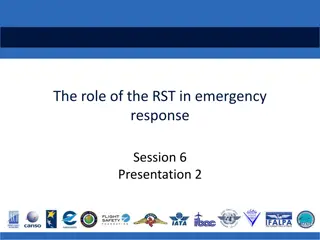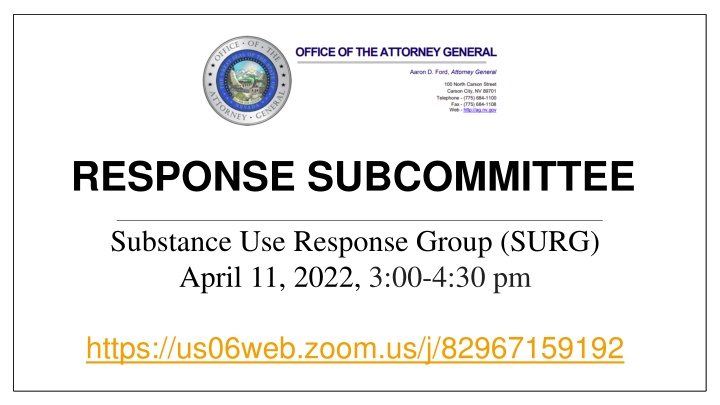
SURG Substance Use Response Subcommittee Meeting April 11, 2022
Join the SURG Substance Use Response Subcommittee meeting on April 11, 2022, from 3:00-4:30 pm. The committee will discuss strategies to improve coordination between law enforcement and public health agencies, focusing on substance use disorders' impact on the criminal justice system.
Download Presentation

Please find below an Image/Link to download the presentation.
The content on the website is provided AS IS for your information and personal use only. It may not be sold, licensed, or shared on other websites without obtaining consent from the author. If you encounter any issues during the download, it is possible that the publisher has removed the file from their server.
You are allowed to download the files provided on this website for personal or commercial use, subject to the condition that they are used lawfully. All files are the property of their respective owners.
The content on the website is provided AS IS for your information and personal use only. It may not be sold, licensed, or shared on other websites without obtaining consent from the author.
E N D
Presentation Transcript
RESPONSE SUBCOMMITTEE Substance Use Response Group (SURG) April 11, 2022, 3:00-4:30 pm https://us06web.zoom.us/j/82967159192
1. CALL TO ORDER AND ROLL CALL TO ESTABLISH QUORUM Chair Tolles
1. Call to Order and Roll Call to Establish Quorum Name SURG ROLE Committee Role Chair Member Member Member Member Member Jill Tolles Christine Payson Dr. Stephanie Woodard Dr. Terry Kerns Shayla Holmes Assembly Minority Appointee Sheriffs' & Chiefs' Assoc. DHHS Director Appointee Attorney General Appointee Rural Human Services (Lyon County) Gina Flores-O Toole SUD Treatment Provider
Public Comment Public comment will be received via the Zoom Meeting. Public comment shall be limited to three (3) minutes per person (this is a period devoted to comments by the general public, if any, and discussion of those comments). No action may be taken upon a matter raised during a period devoted to comments by the general public until the matter itself has been specifically included on an agenda as an item upon which action may be taken pursuant to NRS 241.020.
3. MEMBER INTRODUCTIONS
Member Introductions Name SURG ROLE Committee Role Chair Member Member Member Member Member Jill Tolles Christine Payson Dr. Stephanie Woodard Dr. Terry Kerns Shayla Holmes Assemblywoman,Assembly Minority Appointee Sheriffs' & Chiefs' Assoc. DHHS Director Appointee Attorney General Appointee Rural Human Services (Lyon County) Gina Flores-O Toole *SEI Team SUD Treatment Provider Crystal Duarte, Laura Hale Support
Committee Scope Response Subcommittee will recommend strategies to improve coordination between local, state, and federal law enforcement and public health agencies, with representation from those different agencies. Information sharing regarding trafficking and distribution of legal and illegal substances will be reviewed. The effects of substance use disorders on the criminal justice system will include a deep dive into the sources and manufacturers of substances, and the effectiveness of criminal and civil penalties, with attention to shared responsibility.
Committee Scope The Response subcommittee is tasked with making progress to: (e) Evaluate ways to improve and expand evidence-based or evidence-informed programs, procedures and strategies to treat and support recovery from opioid use disorder and any cooccurring substance use disorder, including, without limitation, among members of special populations. (k) Recommend strategies to improve coordination between local, state and federal law enforcement and public health agencies to enhance the communication of timely and relevant information relating to substance use and reduce duplicative data collection and research. (l) Evaluate current systems for sharing information between agencies regarding the trafficking and distribution of legal and illegal substances which are associated with substance use disorders, including, without limitation, heroin, other synthetic and non-synthetic opioids and stimulants. (m) Study the effects of substance use disorders on the criminal justice system, including, without limitation, law enforcement agencies and correctional institutions. (n) Study the sources and manufacturers of substances which are associated with substance use disorders, including, without limitation, heroin, other synthetic and non-synthetic opioids and stimulants, and methods and resources for preventing the manufacture, trafficking and sale of such substances. (o) Study the effectiveness of criminal and civil penalties at preventing the misuse of substances and substance use disorders and the manufacture, trafficking and sale of substances which are associated with substance use disorders, including, without limitation, heroin, other synthetic and non- synthetic opioids and stimulants.
Committee Scope With shared responsibility to: B. Assess evidence-based strategies for preventing substance use and intervening to stop substance use, including, without limitation, the use or heroin, other synthetic and non-synthetic opioids and stimulants H. Examine qualitative and quantitative data to understand the risk factors that contribute to substance use and the rates of substance use and substance use disorders, focusing on special populations. Q. Study, evaluate and make recommendations to the Department of Health and Human Services concerning the use of the money described in section 10.5 of this act to address substance use disorders.
Committee Scope And attention to special populations: a. Veterans, elderly persons and youth; b. Persons who are incarcerated, persons who have committed nonviolent crimes primarily driven by a substance use disorder and other persons involved in the criminal justice or juvenile systems; c. Pregnant women and the parents of dependent children; d. Lesbian, gay, bisexual, transgender and questioning persons; e. People who inject drugs; (as revised) f. Children who are involved with the child welfare system, and g. Other populations disproportionately impacted by substance use disorders.
Attend meetings and communicate to the chair when unable to do so Attend Roles for Committee Members Provide recommendations in advance of meetings Provide Review materials provided in advance of meetings Review
Roles for Committee Members SURG subcommittees are expected to meet monthly and will have a chair and targeted administrative support. Groups will engage subject matter experts (SMEs) from Nevada and beyond to inform their study and recommendations. The term for the subcommittee membership is expected to be one year, beginning in March 2022 and extending to February 2023. Other important milestones are listed below: March: DHHS Needs Assessment Update; Announce Subcommittee Members and Chairs; Presentations. June: Subcommittee Progress Reports and presentations (based on monthly meetings). September: Subcommittee Recommendations Report and Discussion. January: Final Report Presentation and Approval.
4. REVIEW SUBCOMMITTEE RECOMMENDATION TRACKING TOOL Chair Tolles
5. BASELINE INFORMATION FOR RESPONSE TO SUBSTANCE USE Stephanie Woodard, PsyD, Senior Advisor for Behavioral Health, Department of Health and Human Services
Overview of DPBH Prevention and Treatment Programs
OVERVIEW OF SUBCOMMITTEE AREAS OF INQUIRY From the Joint Interim Health and Human Services Committee Meeting February 17, 2022
Data and Information Sharing Assets High Intensity Drug Trafficking Areas (HIDTA) program Overdose Data to Action (OD2A) Overdose Detection Mapping Application Program (ODMAP) Regional action teams and coordinating bodies Overdose Response Spike Plans in each county Gaps & Recommendations Optimize use of technology: Prescription Drug Monitoring Program (PDMP) Health Information Exchange Registries Analyze data to drive resource allocation and early intervention Policies and procedures to share data, e.g., MOUs for data sharing
Law Enforcement-Public Health Prevention and Coordination Assets Sequential Intercept Model Crisis Response System High Intensity Drug Trafficking Areas (HIDTA) Program Relationships with federal agencies (DEA, CDC, FDA) Overdose Response Spike Plans in each county Naloxone distribution Test Strips Gaps & Recommendations Data sharing across agencies Understanding public health implications and outcomes of mixing various drugs together Harm reduction, distribution of Naloxone, and safe houses Within AB236, prioritize recommendations for funding the behavioral health field response grant program to allow behavioral health teams to respond along with law enforcement in communities
Criminal Justice Assets Justice Reinvestment Initiative, Nevada Local Justice Reinvestment Coordinating Council (to be discussed in detail in the next presentation) Gaps & Recommendations Re-evaluate Civil Protective Custody legislation Examine legislation and regulation that criminalizes in-utero drug exposure Legislation to support diversion and deflection Include MAT, peers, social determinants of health, and harm reduction strategies in criminal justice services and promote telehealth for MAT Examine policy considerations around essential services and MAT Application of drug court best practices Provide linkage to care for court-involved individuals and families and people who are or have been incarcerated Ensure there are adequate and comprehensive evaluations for specialty-court involved populations to identify co- occurring disorders Strengthen connections to and role of Public Defenders
Manufacture and Trafficking Assets High Intensity Drug Trafficking Areas (HIDTA) program Law Enforcement Agencies Gaps & Recommendations Collection and sharing of seizure data Poly drug use complicates investigation and law enforcement s ability to reduce supply Quantity and quality of methamphetamine has increased, while legal changes have reduced Nevada labs Increased availability and purity, combined with low cost
Economic Impacts Assets Nevada using 1915(i) waiver process for to provide reimbursement for supportive housing Gaps & Recommendations Consistently implement housing first initiatives to decrease drug related harms People experiencing homelessness Address gaps for supportive housing Availability of housing
Additional Considerations Justice Department Guidance on Protections for People with Opioid Use Disorder under the Americans with Disabilities Act Nevada has many assets and resources that are not yet at scale Engage individuals with lived experience in programming design considerations Linkage of care for incarcerated, court involved individuals and pregnant women with OUD Establish a bridge MAT program in emergency departments Consider the parity in coverage and participation in a statewide hub-and-spoke model across all payers with limitations on fail-first treatment options, prior authorization, and coverage limits
6. PRESENTATION FROM THE NEVADA SENTENCING COMMISSION Victoria Gonzalez, Executive Director, Nevada Department of Sentencing Policy
Introduction Nevada Department of Sentencing Policy created in 2019 Nevada Sentencing Commission (moved from the Legislature) Make data-driven recommendations for sentencing and corrections policies Facilitate the collection and aggregation of criminal justice data
Issues AB 236 (2019) Justice Reinvestment Initiative: Reduce recidivism, slow prison growth, maintain public safety Tasks the Sentencing Commission with tracking the outcomes from the enactment of the bill Sentencing Commission recommends funding to the Nevada Local Justice Reinvestment Coordinating Council to make grants to counties and programs for treating persons involved in the criminal justice system Created the Nevada Local Justice Reinvestment Coordinating Council Make recommendations to the Sentencing Commission regarding AB 236 at the local level Identify county-level programs and treatment needs for persons involved in the criminal justice system Make recommendations to Sentencing Commission regarding grants to local governments and oversee grants Identify opportunities for collaborating with DHHS at state and local level for treatment services and funding
Relevant Activities Coordinating Council collecting qualitative information about programs and treatment available in each county Coordinating Council working to make a request for an appropriation for an upfront reinvestment to fund grants administered by the Coordinating Council
Special Populations AB 236 revised penalties for certain drug crimes and other non-violent crimes Sentencing Commission collects and analyzes data regarding these reforms AB 236 focused on treatment of behavioral health and substance use of persons involved in the criminal justice system to reduce recidivism Nevada Sentencing Commission collects and analyzes data to evaluate programs and treatment
Gaps Many gaps in being able to collect data to evaluate: Programs Participation Recidivism Success rates
Recommendation(s) Recommendations from SURG on which programs to focus grant funding Support for appropriation to Coordinating Council to administer grants Support to any agency or program who needs help collecting data (this will support the data collection efforts of the Sentencing Commission) Collaboration with the Coordinating Council, other stakeholders, and partners to collect data for requests and measuring outcomes
Contact Information Name Victoria Gonzalez Title Executive Director Phone 775.684.7377 Email vfgonzalez@ndsp.nv.gov
7. CONSIDER RECOMMENDATIONS FOR PRESENTATIONS FROM SUBJECT MATTER EXPERTS FOR FUTURE MEETINGS Dr. Terry Kerns
8. MAY MEETING DATES Chair Tolles
May Meeting Dates May 9, 2022 from 12:30-2:00 p.m. May 17, 2022 1:00-2:30 p.m.
Public Comment Public comment will be and via the Zoom Meeting. Public comment shall be limited to three (3) minutes per person (this is a period devoted to comments by the general public, if any, and discussion of those comments). No action may be taken upon a matter raised during a period devoted to comments by the general public until the matter itself has been specifically included on an agenda as an item upon which action may be taken pursuant to NRS 241.020.
ADDITIONAL INFORMATION, RESOURCES & UPDATES AVAILABLE AT: https://ag.nv.gov/About/Administration/Substance _Use_Response_Working_Group_(SURG)/


